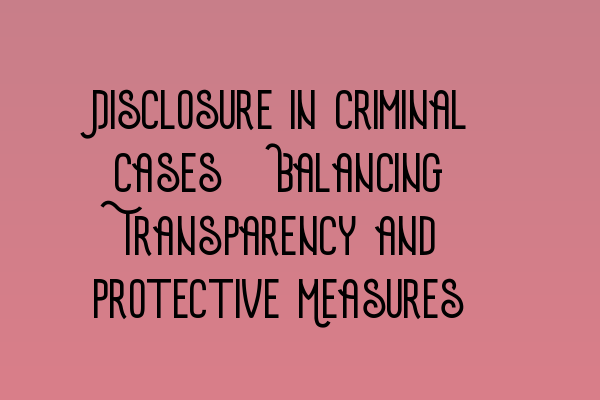Disclosure in Criminal Cases: Balancing Transparency and Protective Measures
In criminal cases, one of the most crucial elements of a fair trial is the principle of disclosure. The disclosure process involves the sharing of information and evidence between the prosecution and the defense. It ensures that both parties have access to all the relevant materials in a case, allowing for a fair and just outcome.
However, the disclosure process can be a complex and challenging one, as it requires striking a delicate balance between transparency and the protection of sensitive information. This blog post will explore the importance of disclosure in criminal cases and the challenges it poses, and how to navigate this crucial aspect of the criminal justice system.
Why is disclosure important?
Disclosure plays a pivotal role in ensuring a fair trial for all parties involved. It is the cornerstone of the criminal justice system, as it helps to guarantee the fundamental principles of equality and adversarial justice. Without proper disclosure, the defense may be at a significant disadvantage, undermining the defendant’s right to a fair trial.
The disclosure process facilitates the defense’s ability to prepare and present their case effectively. It allows them to scrutinize the prosecution’s evidence, identify weaknesses or inconsistencies, and gather their own evidence to challenge the allegations. Similarly, the prosecution has a duty to disclose any evidence that may undermine their case or support the defendant’s innocence.
Balancing transparency and protective measures
While disclosure is essential, protective measures must be in place to safeguard sensitive information and protect the interests of the parties involved. This often requires balancing transparency with the need to withhold certain materials that could compromise public safety, national security, or the privacy of individuals.
To strike this balance, the criminal justice system incorporates various mechanisms and guidelines. These include procedures for the review and redaction of sensitive materials, such as classified documents, confidential informants, and private information about witnesses. It is crucial to follow these procedures meticulously to protect the rights of all parties involved in the case.
Challenges faced in the disclosure process
The disclosure process is not without its challenges. One common challenge is the volume and complexity of the materials involved in a case. As technology advances, the amount of digital evidence, including CCTV footage, phone records, and social media posts, continues to increase. Managing and reviewing these materials can be time-consuming and resource-intensive.
Another challenge is the potential for inadvertent errors or omissions during the disclosure process. It is vital for both the prosecution and the defense to exercise due diligence in identifying and sharing all relevant materials. Failure to do so could lead to allegations of non-disclosure and may result in the case being compromised or even dismissed.
Moreover, public interest considerations can pose another challenge. In high-profile cases, there may be pressure from the media or public opinion to disclose certain materials that could influence public sentiment or compromise the integrity of the trial. It is crucial to carefully balance the interests of justice with these external pressures to ensure a fair process.
Navigating the disclosure process effectively
To navigate the disclosure process effectively, legal professionals must stay abreast of the evolving legal landscape and best practices. Continuing professional development and specialized training can equip solicitors with the skills and knowledge necessary to handle disclosure challenges effectively.
SQE Criminal Law & Practice Law UK offers comprehensive preparation courses, including SQE 1 and SQE 2 preparation courses, to help legal professionals stay updated and excel in the disclosure process. These courses provide a solid foundation in understanding the principles of disclosure and equip practitioners with the practical skills required to navigate this critical aspect of criminal law.
Furthermore, practicing with SQE 1 practice exam questions and utilizing SQE 1 practice mocks (FLK1 FLK2) can reinforce understanding, improve exam readiness, and enhance overall performance in criminal law and practice.
Conclusion
Disclosure in criminal cases is a vital component of the criminal justice system. It ensures the fair and just treatment of all parties involved and maintains the integrity of the trial process. While striking a balance between transparency and protective measures can be challenging, legal professionals must strive to navigate the disclosure process effectively.
By staying updated with the latest legal developments, enrolling in specialized training courses, and practicing with SQE 1 preparation courses and practice materials, solicitors can enhance their skills and knowledge in handling disclosure challenges. This, in turn, contributes to upholding the principles of justice and fairness in the criminal justice system.
For more information on SQE preparation courses, SQE exams dates, and additional resources, please visit SQE Criminal Law & Practice Law UK’s website.
Related Articles:
– SQE 1 Practice Exam Questions
– SQE 1 Practice Mocks FLK1 FLK2
– SQE 2 Preparation Courses
– SQE 1 Preparation Courses
– SRA SQE Exam Dates
